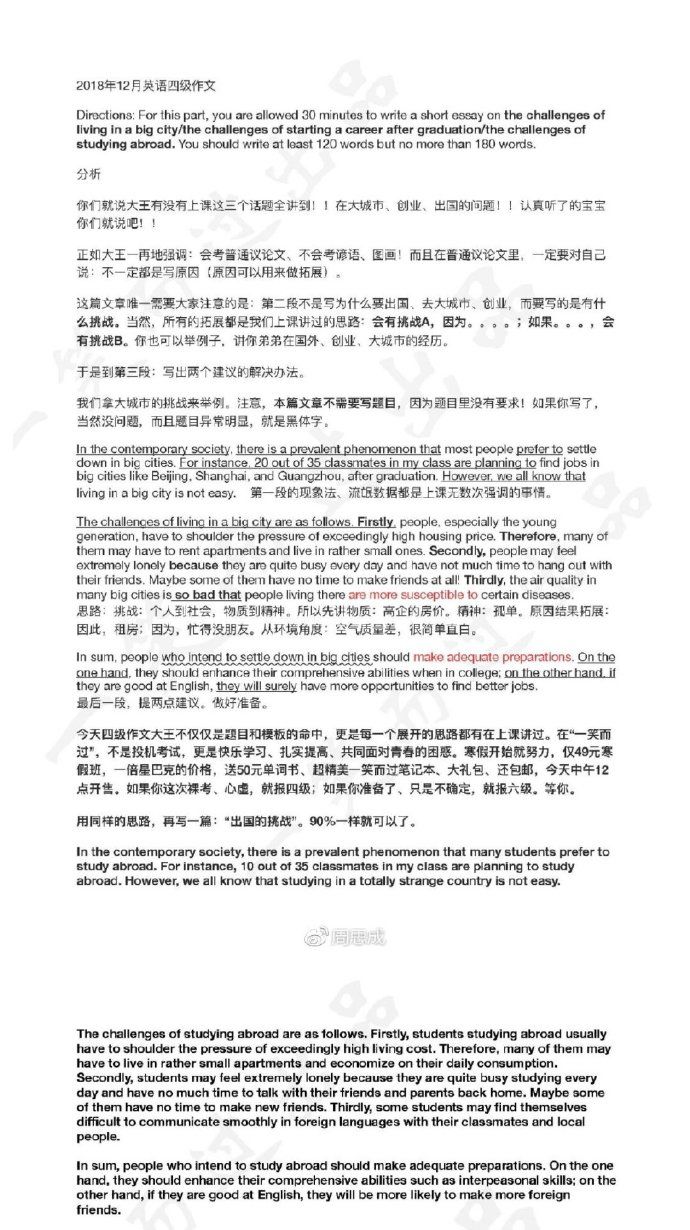雅思阅读第一位的要素是时间
|
上课每当我说到雅思阅读最重要是把题做完,而不是把题做对时,很多同学都觉得好笑。很多人认为把每道题做对才是第一位的,其实不然。事实上如果你能够在规定时间内把题都做完的话,正确率一定不会低,因为雅思阅读,答案是靠定位定出来的,所以能把题做完(而不是胡猜)至少说明你知道到哪里去找答案,有了方向,正确率一定不会低。而在雅思阅读中,常发生的状况是答案找不到不知道填什么,而做错的可能性一般倒不是很高。 下面是雅思考官写的文章,再次说明了时间的重要性。所以在练习中一定要注意把题做快,仅仅能把题做对在实战中是没用的,切记!! Time is your greatest enemy Module Total time Questions Time for each question As you can see, the time constraints are brutal. To succeed, you must ration your time properly. The reason that time is so critical is that every question counts the same toward your final score. If you run out of time on any passage, the questions that you do not answer will hurt your score far more than earlier questions that you spent extra time on and feel certain are correct. On the Reading Module, the test is separated into passages. The reason that time is so critical is that 1) every question counts the same toward your final score, and 2) the passages are not in order of difficulty. If you have to rush during the last passage, then you will miss out on answering easier questions correctly. It is natural to want to pause and figure out the hardest questions, but you must resist the temptation and move quickly.
If you are forced to speed up, do it efficiently. Usually one or more answer choices can be eliminated without too much difficulty. Above all, don’t panic. Don’t speed up and just begin guessing at random choices. By pacing yourself, and continually monitoring your progress against the clock or your watch, you will always know exactly how far ahead or behind you are with your available time. If you find that you are a few minutes behind on a module, don’t skip questions without spending any time on it, just to catch back up. Spend perhaps a little less than half a minute per question and after a few questions, you will have caught back up more gradually. Once you catch back up, you can continue working each problem at your normal pace. If you have time at the end, go back then and finish the questions that you left behind. Furthermore, don’t dwell on the problems that you were rushed on. If a problem was taking up too much time and you made a hurried guess, it must have been difficult. The difficult questions are the ones you are most likely to miss anyway, so it isn’t a big loss. If you have time left over, as you review the skipped questions, start at the earliest skipped question, spend at most another half a minute, and then move on to the next skipped question. Lastly, sometimes it is beneficial to slow down if you are constantly getting ahead of time. You are always more likely to catch a careless mistake by working more slowly than quickly, and among very high-scoring test takers (those who are likely to have lots of time left over), careless errors affect the score more than mastery of material.
|








